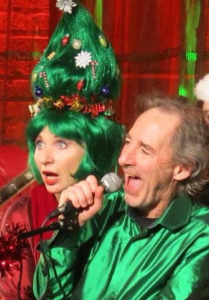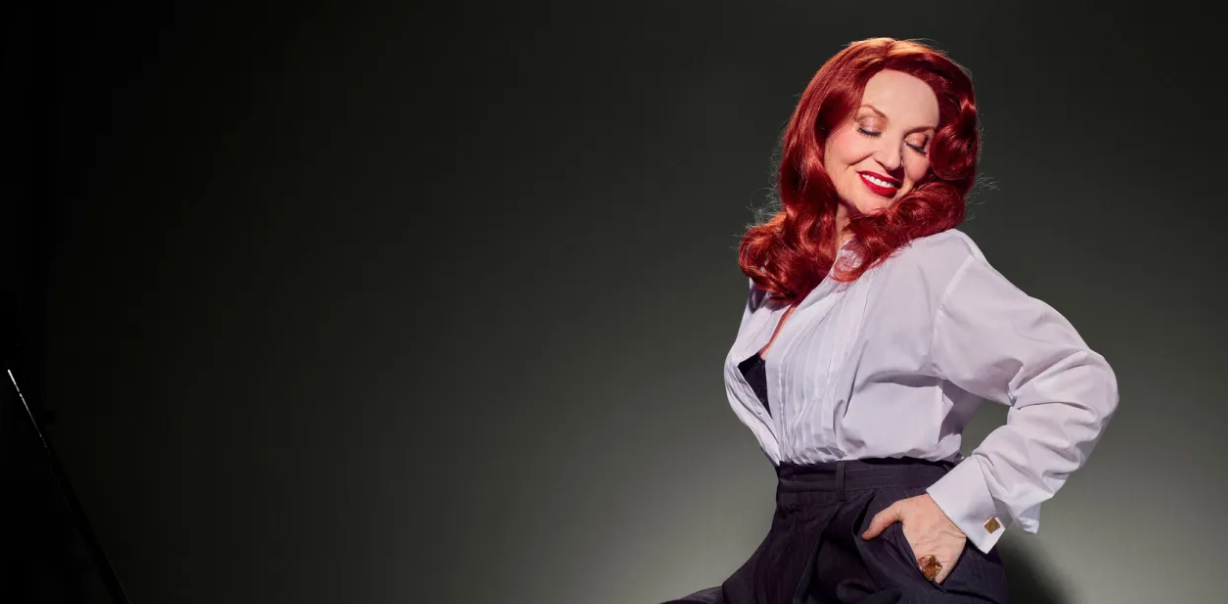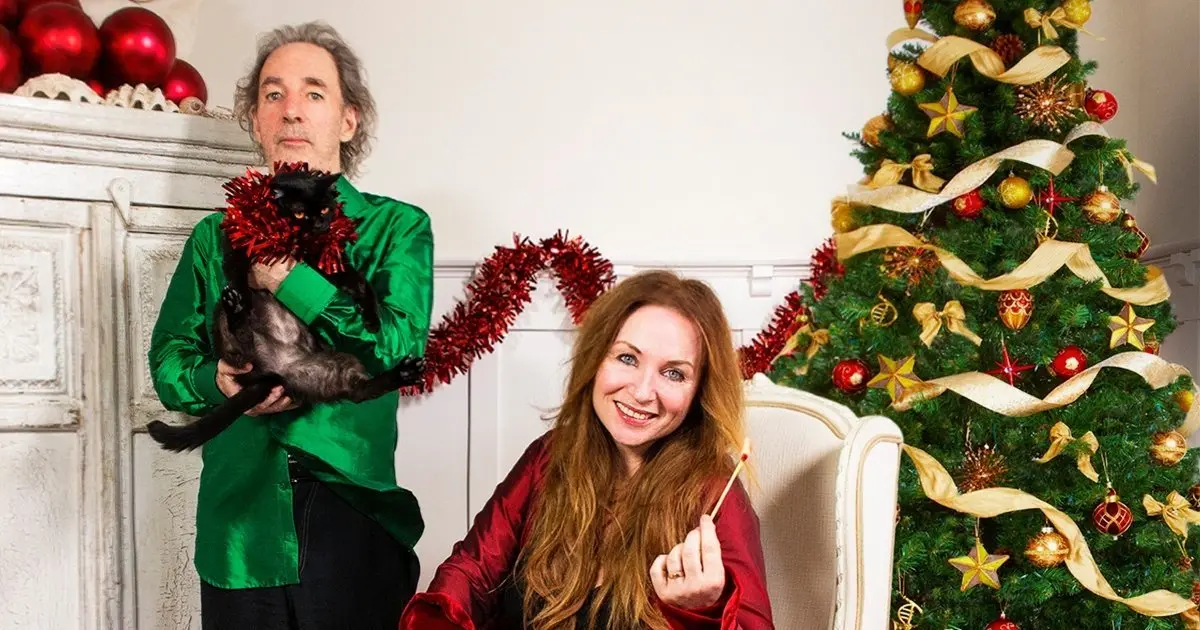Welsh multi-potentialite and quadruple-threat performer Judith Owen sits next to her husband, Harry Shearer, as she brings up the concept of hiraeth—a Welsh term that defies direct translation into English. Hiraeth evokes a profound mix of homesickness, longing, and a deep sadness for what has been lost. When Owen moved to Southern California, she certainly felt a pining for her “melancholy” home across the Atlantic.
“I got depressed at Christmas being homesick… I’m in paradise and it felt so wrong being surrounded by beauty,” she explains. “We had this Christmas party that just became so fabulous. We all sang around the piano and harmonized. It was all of our besties, many of whom are incredible artists, and a sea of champagne. It was very Welsh by the way.”

Judith Owen and Harry Shearer.
Owen reflects on the mixed emotions Christmas often stirs in her. “Christmas has always been bittersweet… it’s hard for many people, with conflicting feelings. It’s supposed to be a children’s holiday, all about twinkling lights and joy. What I’ve always wanted to do is fill that childlike space, but as an adult, to be released—to have fun and be happy. My mother instilled the joy in me, but she passed away right before Christmas when I was a kid. That’s the eternal struggle—those two feelings. So, I look to music to bring me great joy and happiness.”
She smiles as she shifts focus, adding with a laugh, “Poor Harry is not a Christmas person whatsoever. But I instilled in him the truth that the greatest Christmas songs are some of the greatest songs of our time—that kind of changes everything for him. It’s not a religious thing for me… it’s about enjoying the extraordinary songs and the people who write their own songs and share their unique point of view.”
This emotional complexity gave birth to Owen’s Christmas Without Tears concert. After various incarnations of the holiday extravaganza in cities like Chicago, Los Angeles, and London, the event returns to New Orleans, featuring The Jo Big Band, Kermit Ruffins, Tonya Boyd-Cannon, and more. Each year, the performance benefits a local charity, and for Owen and Shearer, there was no doubt who would be the recipient of their generosity this year: The Innocence Project.
Owen explains how her involvement with The Innocence Project of New Orleans began after being introduced to the cause by Mary Howell, the New Orleans-based human rights lawyer and activist. Howell’s work brought attention to the stories of men wrongfully incarcerated. The stories deeply moved Owen, particularly because Louisiana has the highest incarceration rate in the United States, and The Innocence Project of New Orleans doesn’t receive funding from the New York association.
“I knew I had to get involved,” Owen reflects. “I saw this as a meaningful way to give back, especially during the season of goodwill, by helping to free those wrongfully imprisoned.”
Owen finds profound joy in seeing these men released, and she cherishes the moments during performances at the Orpheum when former inmates are honored and celebrated for their resilience, despite the trauma they’ve endured.
The couple gives especially high praise to Gary Tyler, a wrongly incarcerated inmate who was released in 2016 after serving 40 years for what they describe together as “being in the wrong place at the wrong time and the wrong color.” They describe how he taught Shakespeare courses and reading to other inmates while in prison.
“We met him after he was released,” says Shearer. “He refused to let that experience of improper imprisonment destroy his life. He was resolved to make something constructive of his life. I said to Judith and Mary [Howell], ‘I’ve met two people in my life who I could really say were marked with grace, and he was one of them.’”

Judith Owen, photo by Rick Guest.
Piggybacking on his sentiment, Owen adds, “I imagine he had what Nelson Mandela had, which was utter grace… not one speck of bitterness. Utter humanity and kindness.”
Shearer, who is known for his work on The Simpsons and the Spinal Tap films (one of which is set to release next year and was filmed in New Orleans), expresses awe for Tyler. “Imagine meeting a house full of strangers after being in Angola,” he says.
After 30 years of marriage, it’s not uncommon for the musical pair to finish each other’s sentences. In a world with a population of eight billion people, somehow two people who are both the children of classically trained opera singers found each other.
Owen is the daughter of Welsh opera singer Handel Owen. Shearer’s father, Mack Shearer, was a trained opera singer who ran a gas station in Los Angeles. The elder Shearer passed away when Harry was 12.
“It’s always really hard when you have someone you both adore and admire and look up to who is the star in the house,” says Owen. “It’s hard when you are in the same business. That’s why I thought I’d end up as an actress. I kept my music personal and private because I didn’t want to be competing, but there’s nothing you can do about it when it chooses you. You can’t escape it. I came back to it. It always found me. When I was in performance art school—acting, music, and dance—I finally got to perform one of my own songs for the first time in front of anybody. That was the first time I realized that other people reacted to it.”

Judith Owen. Photo by Noé Cugny
The redhead says her fellow students were “sobbing their eyes out” as she sang about her mother, who had passed away around Christmas time when she was young. She wrote and sang a song in the style of a melancholic Welsh hymn.
“My father was an operatic baritone who studied in Vienna,” Shearer says. “I got dragged to opera as a youth, but I fell in the other direction. I grew up on late American pop—Sinatra, Mel Tormé, and Ella Fitzgerald. I really despised Philadelphia rock—the whole Dick Clark thing—but I got my rock light turned on from A Hard Day’s Night. Then I fell in love with rock and roll but also Brazilian music and bluegrass.”
Although Owen has performed some incredibly popular covers of metal and rock pioneers like Deep Purple (also Welsh) and Soundgarden, she remains jazzed about American Black music.
“All the metal bands were playing Black music,” she says. “The Beatles, The Stones—that’s what everyone was listening to, which turned into metal and rock, but what truly kicked it all off was Black American music: the blues. If there wasn’t a New Orleans, there wouldn’t have been people moving up the Delta! What I see in America is that the country lacks an appreciation for its biggest art form.”
The two mention how Europe, Britain, Australia and Japan remain especially enthralled with American musical history. There’s hardly a moment in the conversation where music is not mentioned in some capacity, especially how their love for it is entwined in their lives in New Orleans.
“During the pandemic, I made a conscious decision to focus on creating the most joyful music possible,” Owen shares. “We all knew what Welsh melancholy felt like, and I needed something different. I turned to the badass, unapologetic women musicians from my childhood—those who were the bandleaders, the writers, the ones who owned the stage. They ruled the room, and I wanted to feel that same joy and energy.”
She explains that this focus on joyful music also opened doors to new collaborations with musicians from New Orleans, something she hadn’t fully immersed herself in before. “I’ve worked with some of the finest musicians in the world, but I hadn’t worked with people from this city,” Judith admits. “Finally, I did that deep dive into what makes this place truly special. Friends like David Torkanowsky, one of the best curators of musical talent, helped connect me with the right musicians. He has this magic ability to know who works well together, and I’ve seen the magic of those collaborations firsthand.”
As Judith reflects on her musical journey, she emphasizes how her growth as a performer has shaped her confidence. “I’ve learned how to be that powerful, unapologetic woman who’s in control,” she says. “And that doesn’t come from arrogance. It comes from years of hard work, of being taken seriously as a musician, and of knowing how to command the stage. Being a big personality on stage and really working the audience—that takes guts, but also years of experience and knowledge.”
Shearer points out how the entertainment factor truly sets New Orleans performers apart from the pack. “It’s never stopped having entertainment at its core,” he says. “I posit this as the opposite of when I was a kid and went to New York City and went to Village Vanguard and went to see Miles Davis who played eight bars and walked off the stage.”

Harry Shearer and Judith Owen. Photo courtesy of Christmas Without Tears.
Judith explains how the unique spirit of New Orleans has shaped her, both personally and professionally. “What makes the musicians special in this town, whether you’ve been born here or come here, is the greasy joy you can feel in the air,” she says, her voice reflecting the city’s vibrancy. “The imperfection is real and beautiful. It’s raw, unrefined, but absolutely stunning.”
She continues, recalling how the city has allowed her to shed her previous persona. “I came here uptight and British, and that went right out the window. When you live in a place where wearing wigs and beads is a form of currency, where nobody bats an eyelid if you walk down the street dressed as a crawfish—it’s a city that celebrates life in all its forms.” Judith smiles, capturing the essence of New Orleans: “It’s feast or famine, party or plague, and this city still fizzles with that sensibility.”
For Judith, this freedom of expression has been transformative. “It’s given me the freedom to wear the suit, the hat, and the sequins, and be unafraid of being that larger-than-life performer,” she says. “It’s a wonderful freedom, and it feels great to make an audience laugh, cry, smile and feel good—like they’re in our living room, having a great party. It’s such a touching thing.”
Speaking of touching memories, the two fondly share the story of an audience member reaction from one of their Christmas Without Tears performances on the West Coast. A friend’s boyfriend lamented that before the experience, Christmas had made him “want to stab himself in the eyes with a fork.”
“Now he says he’s coming every Christmas!” exclaims Owen, her eyes wide and bright. “This is the anecdote and it’s irreverent and it’s bloody funny. This party we throw is about friends hanging out around the piano having the best time. That’s the bit at Christmas that we all forget.”
You can see Harry and Judith’s Christmas Without Tears on Tuesday, Dec. 17 at 8 p.m. at The Orpheum Theater. Tickets are available here.



